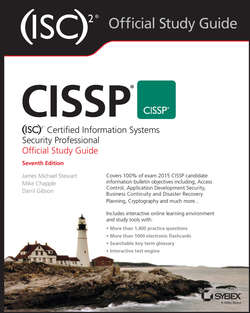Читать книгу CISSP (ISC)2 Certified Information Systems Security Professional Official Study Guide - Gibson Darril - Страница 7
На сайте Литреса книга снята с продажи.
Introduction
ОглавлениеThe CISSP: Certified Information Systems Security Professional Study Guide, Seventh Edition, offers you a solid foundation for the Certified Information Systems Security Professional (CISSP) exam. By purchasing this book, you’ve shown a willingness to learn and a desire to develop the skills you need to achieve this certification. This introduction provides you with a basic overview of this book and the CISSP exam.
This book is designed for readers and students who want to study for the CISSP certification exam. If your goal is to become a certified security professional, then the CISSP certification and this study guide are for you. The purpose of this book is to adequately prepare you to take the CISSP exam.
Before you dive into this book, you need to have accomplished a few tasks on your own. You need to have a general understanding of IT and of security. You should have the necessary five years of full-time paid work experience (or four years if you have a college degree) in two or more of the eight domains covered by the CISSP exam. If you are qualified to take the CISSP exam according to (ISC)2, then you are sufficiently prepared to use this book to study for it. For more information on (ISC)2, see the next section.
(ISC)2
The CISSP exam is governed by the International Information Systems Security Certification Consortium (ISC)2. (ISC)2 is a global not-for-profit organization. It has four primary mission goals:
■ Maintain the Common Body of Knowledge (CBK) for the field of information systems security.
■ Provide certification for information systems security professionals and practitioners.
■ Conduct certification training and administer the certification exams.
■ Oversee the ongoing accreditation of qualified certification candidates through continued education.
The (ISC)2 is operated by a board of directors elected from the ranks of its certified practitioners.
(ISC)2 supports and provides a wide variety of certifications, including CISSP, SSCP, CAP, CSSLP, CCFP, HCISPP, and CCSP. These certifications are designed to verify the knowledge and skills of IT security professionals across all industries. You can obtain more information about (ISC)2 and its other certifications from its website at www.isc2.org.
The Certified Information Systems Security Professional (CISSP) credential is for security professionals responsible for designing and maintaining security infrastructure within an organization.
Topical Domains
The CISSP certification covers material from the eight topical domains. These eight domains are as follows:
■ Security and Risk Management
■ Asset Security
■ Security Engineering
■ Communication and Network Security
■ Identity and Access Management
■ Security Assessment and Testing
■ Security Operations
■ Software Development Security
These eight domains provide a vendor-independent overview of a common security framework. This framework is the basis for a discussion on security practices that can be supported in all type of organizations worldwide.
The topical domains underwent a major revision as of April 2015. The domains were reduced from ten to eight, and many topics and concepts were re-organized. For a complete view of the breadth of topics covered on the CISSP exam from these eight new domain groupings, visit the (ISC)2 website at www.isc2.org to request a copy of the Candidate Information Bulletin. This document includes a complete exam outline as well as other relevant facts about the certification.
Prequalifications
(ISC)2 has defined the qualification requirements you must meet to become a CISSP. First, you must be a practicing security professional with at least five years’ full-time paid work experience or with four years’ experience and a recent IT or IS degree. Professional experience is defined as security work performed for salary or commission within two or more of the eight CBK domains.
Second, you must agree to adhere to a formal code of ethics. The CISSP Code of Ethics is a set of guidelines the (ISC)2 wants all CISSP candidates to follow to maintain professionalism in the field of information systems security. You can find it in the Information section on the (ISC)2 website at www.isc2.org.
(ISC)2 also offers an entry program known as an Associate of (ISC)2. This program allows someone without any or enough experience to qualify as a CISSP to take the CISSP exam anyway and then obtain experience afterward. Associates are granted six years to obtain five years’ of security experience. Only after providing proof of such experience, usually by means of endorsement and a resume, can the individual be awarded CISSP certification.
